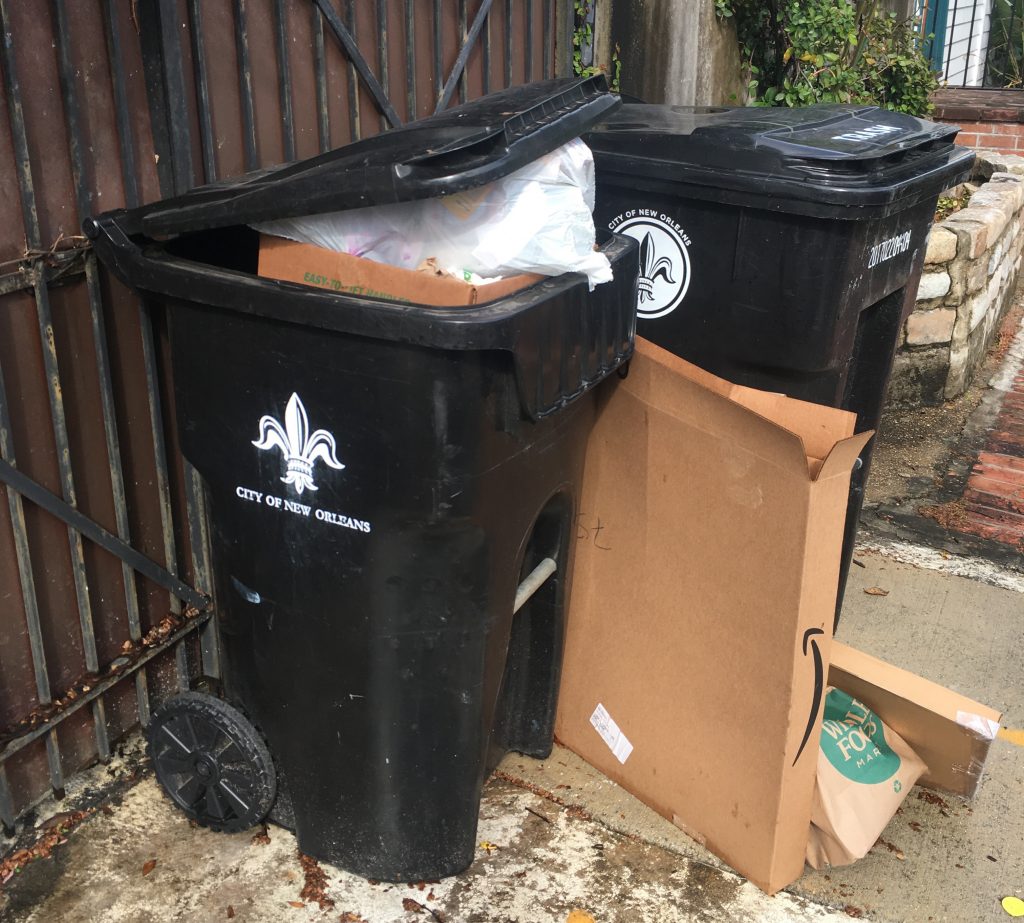
Plastic bags are out, but corrugated cardboard is still accepted for curbside recycling. (Mid-City Messenger)
A crisis in the recycling industry is reflected in what we can and cannot put in our recycling bins starting with this week’s pickup, the city announced.
Here’s what can go into the bin for curbside recycling pickup:
- Plastics: Only #1 (soda/water bottles) and #2 (milk/juice/shampoo/detergent containers);
- Paper: Newspapers, junk mail, phone books, catalogs, office paper; corrugated cardboard, boxboard (cereal boxes/soft drink boxes);
- Metal: Small aluminum and steel cans.
Plastics #3 through #7, wax board (juice boxes/milk cartons) and plastic bags will no longer be accepted by the city’s collection contractors. So the container that once held grated Parmesan or takeout probably can’t be recycled anymore. Check the number inside the triangle; Mardi Gras cups, for example, are generally #5 plastic.
You can also responsibly discard items by taking them to the city’s Recycling Drop-Off Center at 2829 Elysian Fields on the second and fourth Saturdays of each month from 8 a.m. to 1 p.m.
The next recycling drop-off day is this Saturday, May 25. In addition to everything that is accepted curbside, the city will also take old TVs, used batteries, empty wine bottles, those piles of Mardi Gras beads and more off your hands. Here’s what’s accepted:
- The plastic, paper and metal listed above;
- E-waste (computers, laptops, telephones/telephone systems, keyboards, speakers, telephone/computer cables, x-boxes, PlayStation, Wii, MP3/DVD/CD players, UPS, Circuit boards, Portable Navigation/GPS devices, ink jet/toner cartridges, digital cameras/video recorders (DVRs), fax machines, small printers, monitors, processors, networking equipment, stereos, security systems);
- Batteries (AA, AAA, AAAA, C. D, 6 & 9 volt, lithium);
- Light bulbs (incandescent and fluorescent);
- Televisions (Limit 4);
- Glass (Limit 50 pounds);
- Tires (Limit: 5);
- Mardi Gras beads;
- Organics for composting: (fruit and vegetable scraps (peels, skins, pits, or seeds), tea bags, coffee grounds and paper filters, eggshells, nutshells, seed shells, plain bread, grains, and plan pasta (no toppings, meat bones, dairy or foods with oil).
Food and drink containers should be rinsed out before recycling. As always, Styrofoam, containers with food, and greasy pizza boxes are not accepted in the curbside program or at the Recycling Drop-Off Center. Don’t place your recyclables in plastic bags (bags are accepted for recycling in bins at some supermarkets).
The curbside recycling program in New Orleans was at risk of ending entirely. Metro Services Group, one of the city’s collection contractors, received notice from its recycling processor, Republic Services, that it would suspend acceptance of items from residential, single stream, curbside collections effective May 17, the Mayor’s Office stated in a press release.
Republic cited rising costs as a result of China’s ban on the imports of previously accepted types of recyclable materials and changes in contamination level requirements in the global market as the reason for the indefinite suspension.
This announcement required a rapid response by Metro Service Group to secure a change in processors. Although alternative arrangements were successfully completed, the suspension by Republic Services highlighted the current recycling situation on the national, regional and local level.
The city and its contractors scrambled to find a way to improve the marketability of recycled items and reduce contamination. That’s why it is no longer accepting plastics #3 through #7, wax board (juice boxes/milk cartons) or plastic bags at either curbside collection or the Recycling Drop-Off Center on Elysian Fields Avenue.
“We recognize just how important our recycling program is for our people and our city, so we worked alongside Metro, the local business community and our national resilience network to find a solution,” said Ramsey Green, Deputy CAO for Infrastructure and Chief Resilience Officer, in the press release.
Recycling is facing significant challenges. The city urges residents to reduce the amount and types of items purchased and to reuse items. Recent articles on recycling note that the majority of the material collected in recycling programs remains in the United States and is used in the production of consumer goods.
Green added: “We must all do our part to reduce contamination to assist collection, processing and manufacturing companies until new and expanded markets are developed. Although contamination from our area has not exceeded generally acceptable levels, it can be reduced further. It is our hope that these actions will assist in extending the life of the city’s recycling programs.”